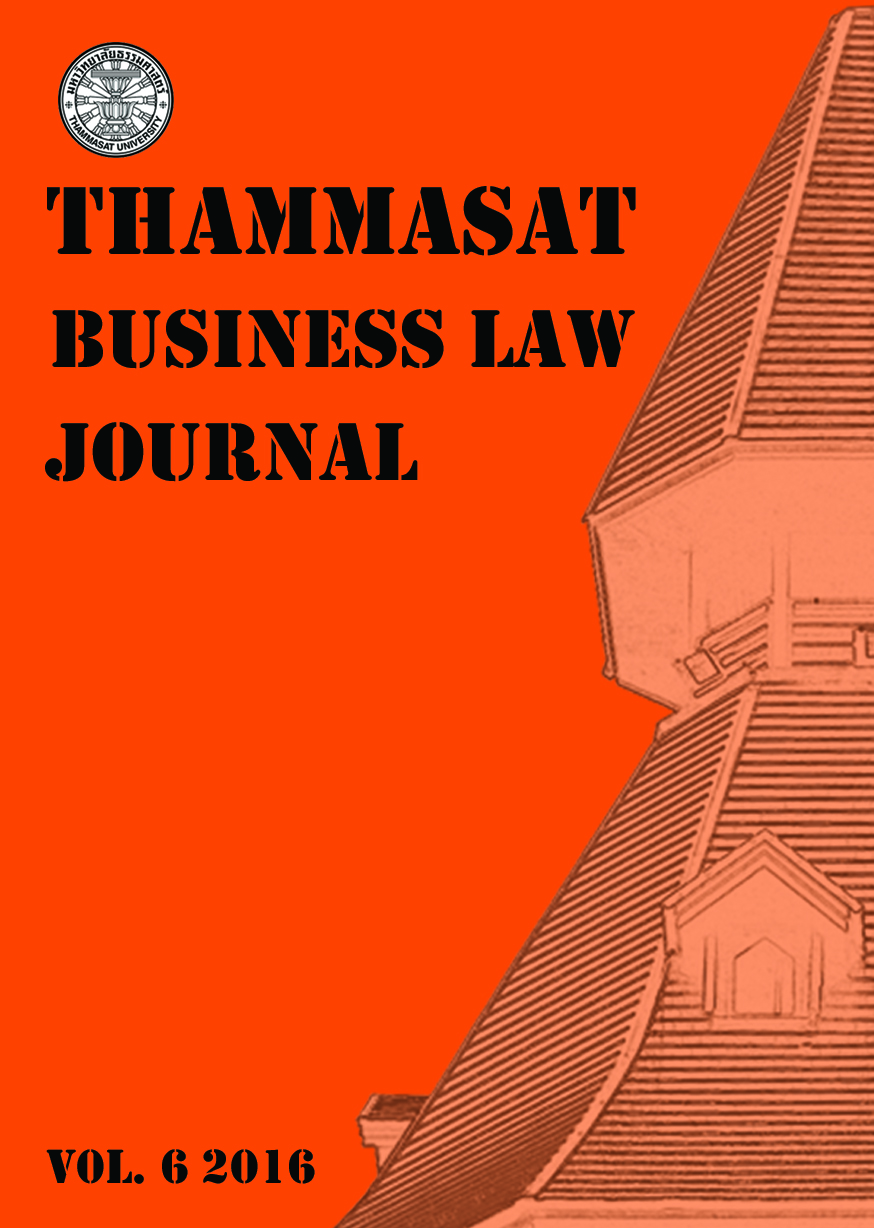PROBLEMS ON LIABILITY OF INTENTIONAL INTERFERENCE WITH PROSPECTIVE ECONOMIC RELATIONS
Main Article Content
Abstract
It is true that each time people pursue their own interests; they interfere with the prospective economic advantage of others. Nevertheless, if they only gently outbid, or offer the attractive interests to induce the others’ potential customers or would-be contracting party not to enter into the future relationship, with such party and enter into contract with them instead, the inducers’ acts are totally lawful. However, if the interferer’s conduct engaged in improper means or abuse of right, there should have any measures to eliminate the culpable conduct and any compensation to award the injured person.
Multiple jurisdictions have, both expressly and impliedly, recognized the liability of unlawful interference with economic relations allowing a person who suffered as a result of the unlawful interference with his business expectancy to sue for damages notwithstanding the absence of the existing contract. Thai law does not have specific provision regarding this liability. Lack of specific requirement may create the flexibility on a case-by-case basis but it may also generate an inconsistency in the jurisprudence.
The right of “prospective economic relations” may be regarded as the right to compete or the right to pursue reasonable interests without undue interference. Under Thai tort law, the interpretation of “other right” under 420 can cover this kind of right. Even if there is no express provision regarding this kind of liability, section 420 (general provision), section 423 (civil defamation), section 421 (abuse of right) and section 5 (good faith principle) is sufficient to copes with this area of law. Hence, it may be better to leave the court using the discretion based on a case-by-case basis than to stipulate the specific provisions relating to this area of law.
Article Details
References
Carty, Hazel. An Analysis of the Economic Torts. 2nd ed., Oxford: Oxford University Press, 2010.
Christie, George and Joseph Sanders. Advanced Torts: Cases and Materials. 2nd ed., Minnesota: West Academic, 2004.
Spindler, Gerald and Oliver Rieckers. Tort law in Germany. Alphen aan den Rijn, The Netherlands : Kluwer Law International, 2011.
Youngs, Raymond. English, French and German Comparative Law. London: Cavendish, 1998.
จิตติ ติงศภัทิย์. ป.พ.พ. บรรพ 2 มาตรา 354 – 452 ว่าด้วยมูลหนี้. กรุงเทพฯ: โรงพิมพ์มหาวิทยาลัยธรรมศาสตร์, 2526
(Jitti Tingsaphat. Civil and Commercial Code Part II section 354-452 Relating to Source of Obligations. Bangkok: Thammasat University Printing House, 1983.)
Byers, Michael. “Abuse of Rights: An Old Principle, A New Age”, McGill Law Journal 47 (2002): 389. http://scholarship.law.duke.edu/cgi/viewcontent.cgi?article=5574&context=faculty_scholarship
Eulau, Peter H., “Inducing Breach of Contract: A Comparison of the Laws of the United States, France, the Federal Republic of Germany and Switzerland”, Boston College International and Comparative Law Review 2, no. 1 (January 1978): 43. http://lawdigitalcommons.bc.edu/iclr/vol2/iss1/3/
Larry Watkins, “Tort Law – Tortious Interference with Business Expectancy – A Trap for the Wary and Unwary Alike.” University of Arkansas at Little Rock Law Review 34, no 3 (2012): 619-641. http://lawrepository.ualr.edu/lawreview/vol34/iss3/6.
Newman, Zachary G. and Anthony P. Ellis, “Navigating the Nuances of Tortious Interference Claims”, Business Torts Journal, American Bar Association Section of Litigation 18, no.4, (2011): 20, available at http://www.hahnhessen.com/uploads/39/doc/2011_06_zgn_ae_navigatingnuances.pdf
Stevens, Lyn L. “Interference with Economic Relations: Some Aspects of the Turmoil in the Intentional Torts.” Osgoode Hall Law Journal 12, no. 3 (December 1974): 595-625. http://digitalcommons.osgoode.yorku.ca/ohlj/vol12/iss3/5/
ไพจิตร ปุญญพันธุ์, “ความรับผิดก่อนสัญญากับความรับผิดซ้อนกัน”, 47 ดุลพาห. 3 (2543).
(Paijit Punyapan, “Precontractual Liability and Concurrent Liability”, 47 Dullapaha. 3 (2000).)
นพรัตน์ สนั่นพานิชกุล. “สิทธิอย่างหนึ่งอย่างใดตามบทบัญญัติมาตรา420: ศึกษาในแง่ประวัติศาสตร์และหลักกฎหมายเปรียบเทียบ.”วิทยานิพนธ์ปริญญามหาบัณฑิต, คณะนิติศาสตร์ มหาวิทยาลัยธรรมศาสตร์, 2538
(Nopparat Sananpanichkul. “Any Right Pursuant to Section 420: Study on Historical Dimension and Comparative Law.” Master’s thesis, Thammasat University, Laws, 1995)
Chisholm, Adam D.H. “Shine a Light: New Perspectives on Intentional Interference with Economic Relations”, McMillan, http://www.mcmillan.ca/102040 .(accessed July 17, 2015)
Duhaime's Law Dictionary Online.http://www.duhaime.org/LegalDictionary/U/UnlawfulInterferencewithEconomicInterests.aspx (accessed July 17, 2015)
Morritt, David S., Mary Paterson and Geoffrey Hunnisett. “Canada: Supreme Court clarifies “Unlawful Means” Requirement in Tort of Unlawful Interference with Economic Relations.” Osler,https://www.osler.com/en/resources/regulations/2014/supreme-court-clarifies-unlawful-means%E2%80%9D-requireme (accessed July 30, 2015)
Kain, Brandon and Anthony Alexander. “The Unlawful Means Element of the Economic Torts: Does a Coherent Approach Lie Beyond Reach?.” Mccarthy Tetrault, https://www.mccarthy.ca/pubs/The_Unlawful_Mean_Element_of_the_Economic_Torts_Does_a_Coherent_Approach_Beyond_Reach.pdf (accessed September 5, 2015)
Phillips, Bradley. “Claims Against Competitors for Business Interference Must Meet Strict New Supreme Court Test to Succeed.” Commercial Litigation Update, April 2014.
http://www.blaney.com/articles/claims-against-competitors-business-interference-must-meet-strict-new-supreme-court-test (accessed August 10, 2015)
Rosenhek, Steven F and Brad Freelan. “The Torts of Good Faith Bargaining, Inducing Breach of Contract and Intentional Interference with Economic Interests.” Fasken Martineau. http://www.fasken.com/en/torts-of-duty-of-good-faith-bargaining (accessed August, 25 2015)
SJ Berwin LLP. “Claims without Contract: Economic Torts Come of Age”, LEGAL 500 (March 2009), http://www.legal500.com/developments/6629


